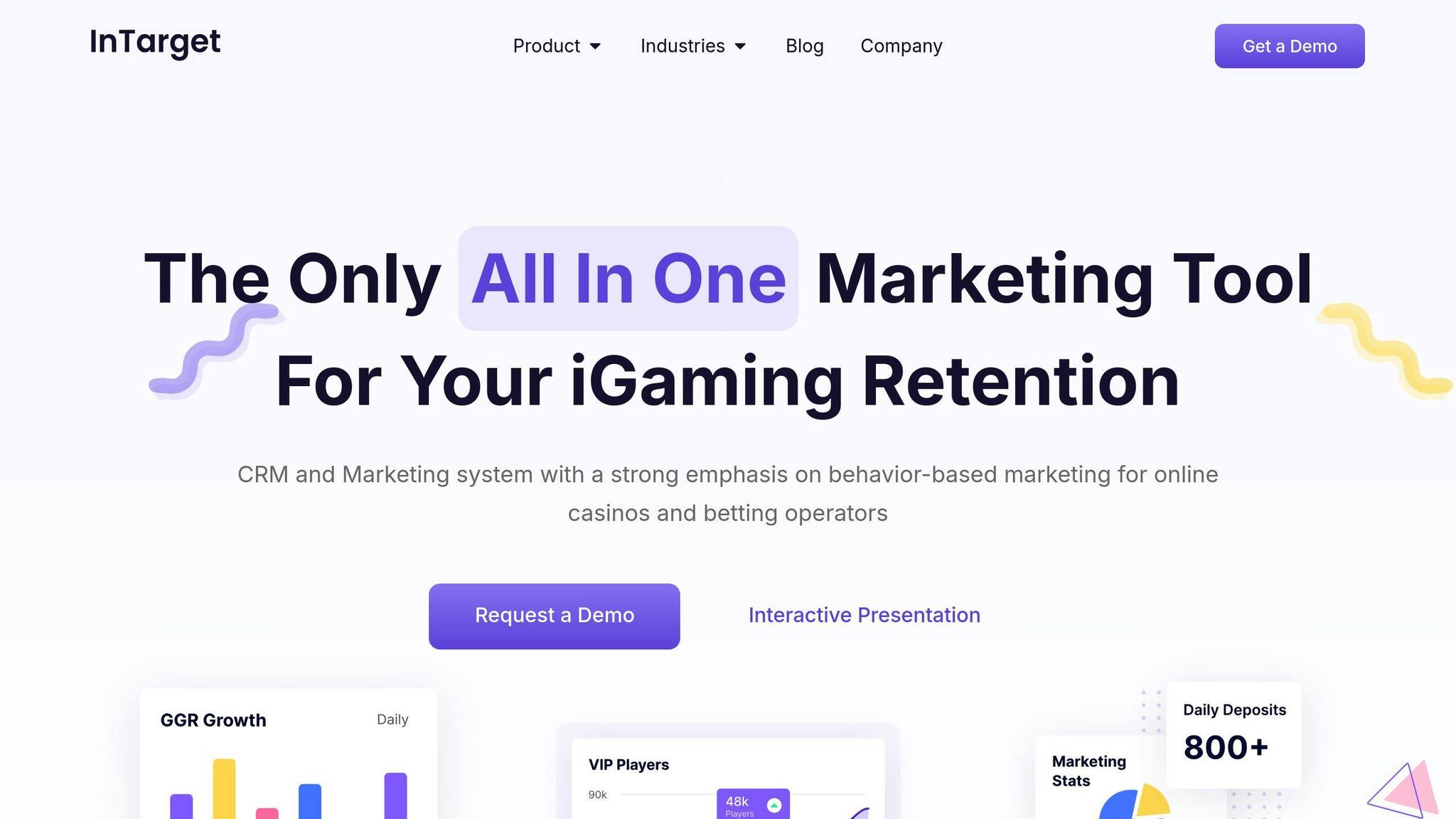In iGaming, disconnected data systems cause major problems like poor player experiences, compliance risks, and lost revenue. Fixing these issues requires integrating data across platforms. Here’s a quick summary:
- Key Problems:
- Scattered data leads to irrelevant offers, compliance failures, and financial errors.
- Data silos make it hard to personalize campaigns or track players effectively.
- Compliance challenges arise from fragmented systems, risking fines and reputational damage.
- Solutions:
- Use CRM and automation tools to unify player data and improve targeting.
- Leverage APIs for real-time data sharing and accurate reporting.
- Opt for scalable, cloud-based platforms to handle growth and changing regulations.
- Best Practices:
- Break integration into phases to minimize disruptions.
- Regularly audit data for accuracy and consistency.
- Collaborate with industry specialists to streamline the process.
Integrated systems improve player retention, streamline operations, and ensure regulatory compliance. The future of iGaming data integration lies in AI, blockchain, mobile-first designs, and advanced payment systems.
Challenges with Data Integration in iGaming
Issues with Combining Data from Multiple Platforms
Merging data across different gaming platforms is no easy task in the iGaming industry. Online casinos, sportsbooks, and lottery platforms often rely on systems and formats that don’t work well together, complicating the integration process. Wallet systems, in particular, face challenges in maintaining smooth data flow, especially when managing cross-platform transactions, multiple currencies, and varying regional regulations. These issues can result in balance errors, transaction delays, and inconsistencies in financial reporting.
| Integration Challenge | Impact on Operations |
|---|---|
| Real-time Data Sync | Delayed balance updates, betting errors |
| Multiple Currencies | Inconsistent financial reporting |
| Payment Processing | Duplicate transactions, reconciliation issues |
Problems with Data Silos and Format Differences
Data silos are a major roadblock for operators aiming to provide tailored player experiences and improve marketing strategies. When player data is locked away in separate systems, marketing teams struggle to design effective campaigns or monitor player activity across platforms. This lack of connectivity also affects relationships with affiliates, potentially damaging trust and long-term partnerships.
The issue goes beyond marketing. Payment systems, game providers, and customer support platforms that don’t communicate effectively create a disjointed player experience and drive up operating costs. This lack of integration can significantly impact the efficiency of daily operations.
Compliance Risks from Disconnected Data
Disconnected systems also create serious compliance challenges. Operators must meet strict requirements for player verification, anti-money laundering (AML) checks, responsible gaming measures, and regulatory reporting. Without integrated systems, staying compliant becomes a daunting task, especially for operators working across multiple jurisdictions with varying reporting standards and data requirements.
Modern analytics tools can process data efficiently to support compliance and operational goals. However, fragmented systems make it harder to detect critical issues, such as problem gambling or suspicious activities, which could lead to regulatory fines or damage to the company’s reputation.
These challenges underline the importance of strong data integration strategies. In the next section, we’ll explore how operators can overcome these hurdles to improve player retention, streamline operations, and stay compliant in a competitive market.
Solutions for Data Integration Problems
Using CRM and Marketing Automation Tools
CRM and marketing automation platforms bring player data together in one system, tackling issues like inconsistent formats and fragmented profiles. By standardizing and cleaning data, these tools create unified profiles that are easier to analyze and act upon. Here’s how they help:
| Feature | How It Helps |
|---|---|
| Automated Data Cleaning | Fixes format issues and removes inefficiencies |
| Cross-platform Analytics | Offers a complete view of player behavior across platforms |
Why APIs Are Key for Data Integration
APIs play a central role in managing data for iGaming businesses. They allow real-time data sharing between systems like payment gateways, game providers, player verification tools, and loyalty programs. This solves problems such as delayed balance updates and ensures accurate financial reporting.
APIs streamline processes by:
- Cutting out manual data entry
- Keeping data consistent across platforms
- Handling large transaction volumes
- Reducing errors in operations
Plus, APIs are built to grow with your business. They ensure your systems can handle increasing demands, which is crucial as your operation scales.
Preparing for Growth with Scalable Solutions
To keep up with growth, it’s important to choose solutions that can handle increasing data and adapt to new technologies. Look for systems that:
- Manage larger data volumes effectively
- Adjust to new data formats and tools
- Stay compliant with changing regulations
Cloud-based platforms are a great option, offering flexibility to expand without overhauling your infrastructure. Start with essential integrations, and as your business grows, add advanced tools for deeper analysis and automation.
Tips for Successful Data Integration in iGaming
Taking a Phased Integration Approach
Breaking the integration process into manageable phases helps iGaming operators handle complex systems without major hiccups. This strategy reduces disruptions and allows for smoother transitions between different stages.
By working in phases, operators can test the systems, fix problems early on, tweak their methods based on results, and keep operations running without interruptions.
Ensuring Data Accuracy and Consistency
Regular audits and continuous monitoring are key to maintaining reliable data across all systems.
| Audit Focus | How to Implement |
|---|---|
| Data Synchronization | Utilize dependable tools to detect and fix sync issues |
| Source Verification | Cross-check data from multiple sources to find inconsistencies |
| Quality Checks | Investigate and address the root causes of any data errors |
| Automated Monitoring | Set up alerts to flag unusual patterns or anomalies |
Collaborating with Industry Specialists
Teaming up with experts helps minimize risks and speeds up the integration process.
"InTarget simplifies data integration by automating processes and turning multiple data sources into actionable insights, helping operators enhance engagement and retention."
Working with specialists offers several advantages:
- Access to tested integration methods
- Knowledge of industry-specific regulations
- Quicker resolution of technical issues
- Lower overall costs during implementation
Look for partners with a strong track record in iGaming and proven success in tackling similar challenges. Their expertise and tools can help operators turn potential obstacles into opportunities for growth and improved performance.
Examples of Successful Data Integration in iGaming
How InTarget Tackles Integration Challenges


In the iGaming world, effective data integration has led to impressive improvements in both operations and player engagement. A standout example is InTarget, which takes a well-rounded approach to managing data and automating marketing tasks.
Take 188BET, for instance. By unifying their data, they were able to boost personalized campaigns and improve player interactions. Their efforts led to an 86% accuracy rate in predicting customer churn. On top of that, they enhanced user navigation, tailored game recommendations, and increased campaign response rates with targeted messaging.
"Data drives innovation and growth in iGaming when properly collected and utilized."
Key Trends in Data Integration for iGaming
The way data integration is being used in iGaming is constantly changing, thanks to new technologies and methods. These advancements are helping solve long-standing challenges while building stronger player trust and engagement:
- Blockchain Integration: Platforms are adopting blockchain to ensure secure and transparent gaming outcomes, addressing concerns about data integrity.
- AI-Driven Analytics: AI tools analyze integrated data to create personalized player experiences, effectively tackling issues with fragmented data and boosting engagement.
- Mobile-First Architecture: With mobile gaming on the rise, seamless data integration is essential for consistent experiences across devices, meeting the demand for cross-platform compatibility.
- Advanced Payment Systems: Integrating multiple payment gateways with player data is now critical. This supports multi-currency transactions while ensuring security and compliance.
These trends highlight the growing need for scalable and reliable data integration strategies as the iGaming industry continues to advance.
Conclusion: Key Points and Future Trends
To succeed with data integration, focusing on security, scalability, and compliance is crucial. By addressing these areas and using tools like CRMs and APIs tailored for iGaming, businesses can tackle challenges such as data silos and inconsistent formats more effectively.
At the same time, new technologies are reshaping how data integration works in the iGaming industry. Key trends include:
- AI-Powered Analytics: AI helps operators deliver personalized experiences and manage risks in real time, improving player engagement and safety.
- Cloud-Based Solutions: Cloud infrastructure allows businesses to handle increasing data volumes without compromising performance.
- Stronger Security Measures: With regulations becoming stricter, advanced security systems are now a must-have.
Platforms like InTarget highlight how integrated solutions can enhance player engagement and retention. By combining AI-driven analytics with cloud-based scalability, these tools simplify integration and improve operational efficiency in iGaming.
For iGaming businesses to stay competitive, they should emphasize:
- Performing regular data audits
- Using standardized data formats
- Implementing strong validation processes
- Prioritizing security
- Ensuring compliance with regulations
FAQs
How to fix data silo?
Here’s how you can address data silos in iGaming operations:
- Encourage Collaboration: Promote a culture where data-sharing across departments is the norm. Breaking down barriers helps teams work together more effectively.
- Centralize Data: Bring all iGaming data – like player profiles, transactions, gameplay stats, and compliance records – into one centralized system. This simplifies access, boosts efficiency, and supports both player personalization and regulatory requirements.
- Use Integration Tools: Leverage platforms like InTarget to combine fragmented data into actionable insights. This helps streamline operations and tailor marketing efforts.
- Secure Role-Based Access: Implement role-specific data access to ensure security. This way, teams can get the data they need without compromising compliance or safety.
Practical Steps to Get Started:
| Step | Action | Outcome |
|---|---|---|
| Audit & Strategy | Identify silos and create a plan | Clear roadmap |
| Centralize & Secure | Consolidate data and set access controls | Data security |
| Monitor & Optimize | Track progress and refine the process | Better results |
Fixing data silos isn’t a one-time task – it requires continuous evaluation and updates. Tackling this issue sets the stage for smoother integration and opens the door to more advanced strategies in iGaming.
